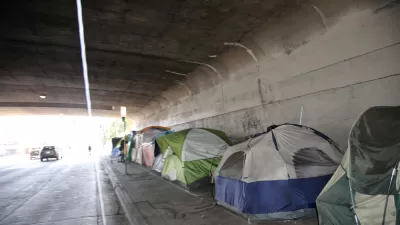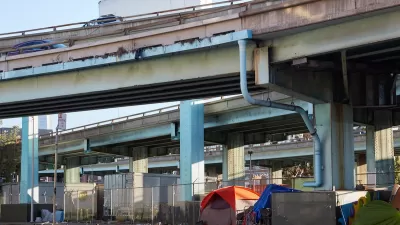While homelessness rose in most U.S. regions, Hennepin County invested heavily in programs to end chronic homelessness and get people into temporary and supportive housing faster.

Writing in Bloomberg CityLab, Sarah Holder explains how Hennepin County, Minnesota, home to Minneapolis, reduced its unhoused population by 80 percent between 2017 and 2022. The county is “something of a national outlier:” in 2023, homelessness nationwide grew by 12 percent.
As Holder explains, the county’s success came “via a combination of funding, deep community engagement and a housing-first approach that’s matched with real housing resources, local officials say.” The county used the Built for Zero framework created by the nonprofit Community Solutions to develop its policy strategy, which includes starting with a focus on the most vulnerable, chronically homeless residents. “For Hennepin County, the hope is that this single-minded focus on housing the 12% of the total homeless population who have been homeless for the longest will ultimately translate into broader progress on a problem confounding so many US cities.”
The article details Hennepin County’s approach, which includes a ‘Rapid Re-Housing’ model, zoning reform, and significant investment in affordable housing and rental assistance programs, as well as building out its temporary shelter system to protect unhoused people during Minnesota’s harsh winters.
FULL STORY: Beating the Odds on Chronic Homelessness in Minneapolis

Planetizen Federal Action Tracker
A weekly monitor of how Trump’s orders and actions are impacting planners and planning in America.

Congressman Proposes Bill to Rename DC Metro “Trump Train”
The Make Autorail Great Again Act would withhold federal funding to the system until the Washington Metropolitan Area Transit Authority (WMATA), rebrands as the Washington Metropolitan Authority for Greater Access (WMAGA).

The Simple Legislative Tool Transforming Vacant Downtowns
In California, Michigan and Georgia, an easy win is bringing dollars — and delight — back to city centers.

The States Losing Rural Delivery Rooms at an Alarming Pace
In some states, as few as 9% of rural hospitals still deliver babies. As a result, rising pre-term births, no adequate pre-term care and harrowing close calls are a growing reality.

The Small South Asian Republic Going all in on EVs
Thanks to one simple policy change less than five years ago, 65% of new cars in this Himalayan country are now electric.

DC Backpedals on Bike Lane Protection, Swaps Barriers for Paint
Citing aesthetic concerns, the city is removing the concrete barriers and flexposts that once separated Arizona Avenue cyclists from motor vehicles.
Urban Design for Planners 1: Software Tools
This six-course series explores essential urban design concepts using open source software and equips planners with the tools they need to participate fully in the urban design process.
Planning for Universal Design
Learn the tools for implementing Universal Design in planning regulations.
Smith Gee Studio
City of Charlotte
City of Camden Redevelopment Agency
City of Astoria
Transportation Research & Education Center (TREC) at Portland State University
US High Speed Rail Association
City of Camden Redevelopment Agency
Municipality of Princeton (NJ)





























